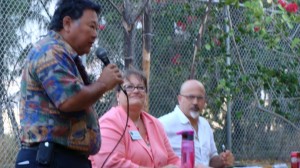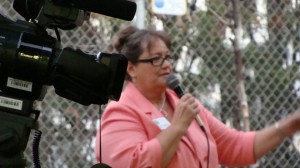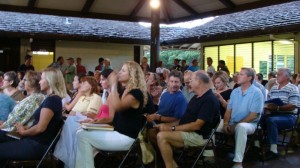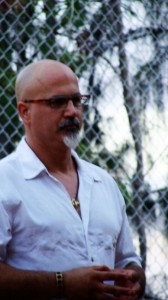VIDEO: Full-Fledged Film Industry at Forefront of Maui Discussions
By Wendy Osher
[flashvideo file=http://www.youtube.com/watch?v=qxiT6azXd2g /] More than 150 people filled the Kahului Community Center for a town hall meeting of the Maui Film Office on Monday night to discuss the future of the island’s film industry.
“We need to get the word out that Maui is now open for production,” said Harry Donenfeld, Maui Film Commissioner, and head of the Maui Film Office.
“We’re not just a pretty beach; we’re not just the site of Haleakala. There is an incredible amount of talent in this room and the world needs to know that you folks are available for hire. When they come here to shoot, they need to start looking at you first–and then they can look to the outside world,” said Donenfeld.
Council Considers $7 M Infusion to OED Fund that Could Help Film Industry Needs
Maui Mayor Alan Arakawa noted that the Maui County Council has already created zoning provisions for future production studios, and is currently contemplating the infusion of $7 million into an OED revolving fund created under the Finance Department.
“This is frankly nothing shy of miraculous and wonderful for the county of Maui,” said Donenfeld. “This allows the office of economic development to have access to real funds to be able to allow us to incentivize or to create opportunities for job creation… We have the ability to try and create programs and scenarios that will help move the film industry forward, and we can do it financially and not just with words–and that’s a very big thing for Maui. It means that we don’t have to rely on the state,” said Donenfeld.
Teena Rasmussen, Director of the Office of Economic Development said the way the fund is set up will allow use for many different purposes including grants or loans and use by for- or non-profit companies or agencies.
“We want to use that hopefully for something that’s going to be very structural, and something that’s going to provide longevity and jobs. We’re looking at sound stages; we’re looking at all different kinds of infrastructure projects; but we’re still open to taking ideas–and that’s another reason why we want to hear from you,” said Rasmussen.
Diversifying the Economy Through a New Revenue Stream
Ultimately, Donenfeld said the purpose of the gathering was to support the Mayor’s vision for creating a new industry and revenue stream for the county.
“In doing so,” said Donenfeld, “all of you will get what you want, which is work,” he said.
“This is job creation–it’s not so that somebody can bring people from LA and utilize our space–although I’m sure some will–but the ultimate goal here is that we create a facility where we can show off our talents, our equipment, and our know-how so that the rest of the world can see and utilize that,” said Mayor Arakawa.
Arakawa said the film industry has key components that will help to diversify and stabilize the economy, including high-paying, long-term jobs, skilled workers, and a different trend than that of tourism and construction.
“We’re absolutely convinced we need to create another economic development area,” said Mayor Arakawa. “We don’t want to be dependent on the national trends which may collapse on us, and have nothing to defend ourselves with. We want to be able to make sure that our economy is stable, no matter what happens. This will allow us to be able to work in a totally different area, and allow that stability,” said Arakawa.
“With the tourist industry, construction, and agriculture, we find that we have economic slumps that create problems within our community. The film production area, and film in general, is a way that we can develop an entirely new industry in our community that has all of the components that we’re looking for,” said the mayor.
“We are not just going to look at the mainland US to attract film productions–we’re going to Asia–we’re going to look globally,” said Rasmussen. “We know we’re special; we know what we have to offer. So I just wanted to tell you that we are looking beyond the shores of the United States for film work, and I think we’re going to be very successful with your help,” said Rasmussen.
Tax Credit Legislation Key to Establishing a Maui Film Industry
In January, Arakawa released information that he had been discussing the possibility of establishing a major motion picture studio with Relativity Media CEO and founder Ryan Kavanaugh.
A bill was introduced in the last legislative session seeking tax credits to help facilitate the construction of Film Production Studios in the islands. SB318 sought the establishment of digital media enterprise subzones surrounding University of Hawaii campuses, and the establishment of tax benefits for digital media infrastructure development and operation.
While the bill failed to pass this year, Donenfeld said some form of state legislation is “desperately required for moving forward with the film industry.”
Donenfeld outlined two key components of the legislation, including an infrastructure tax credit, and a slight bump in the existing tax credit that’s already offered to production companies in Hawai’i.
Currently, production companies get a 20% tax credit on all production expenses that are bought here. “Our goal is to try and increase that to 25% or possibly 30%,” said Donenfeld, who noted that last year’s version of the bill sought a 40% tax credit.
“The state of Hawai’i determined it is too difficult, and too fiscally irresponsible for it; but the 25-30% bracket should be acceptable. That would put us in an incredibly competitive edge in the marketplace. The jurisdictions that we’re competing with can be upwards of 30% as a tax credit, so being able to compete at their level is very important,” said Donenfeld.
The other is the infrastructure credit, allows for companies to invest in the infrastructure of the film and television industry here in the state. “This allows the state of Hawai’i to become competitive,” said Donenfeld, who said the high tax incentive program in Connecticut has drawn production from the likes of New York.
Although the bill has been occasionally called the Kavanaugh Bill, Donenfeld assured meeting attendees that the bill is for everybody including other companies that may also have an interest in establishing studios in Maui County.
“At the moment what we would like to say is very simply, we support him and his efforts to create a studio here on the island. We look forward to that if it’s able to go through. While the infrastructure tax credit in part is for that, it’s much greater that Ryan Kavanaugh, it’s for all of you, it’s for the future and your children so that we can actually create a real industry here,” said Donenfeld.
A Call to Action: Identifying Maui’s Talent Pool
The meeting drew a who’s-who of on-scene and behind-the-scenes faces ranging from actor Branscombe Richmond, to Cynthia Clark of the Chameleon Talent agency, and cast members from the Maui-made film “Get a Job.”
In order to quantify the talent pool on island, and provide evidence of an existing workforce, organizers called on attendees to fill out questionnaires.

Maui Mayor Alan Arakawa discussed his plans for a full-fledged film industry on Maui. Photo by Wendy Osher.
“We want to identify people on this island that can work in the film industry, or have locations, or resources or equipment, or whatever interest that you have, because we are tired of O’ahu saying you have to send our people over to Maui to do the film industry. We want to know who you are; we want to know what you have to offer to the industry–that’s going to give us our fastest start,” said Rasmussen.
Mayor Alan Arakawa called on attendees to provide information on their talents and services. “We have to be able to show them very clearly that we do have talent here, and that we’ve got serious talent here, and other people that are willing to learn about the industry, and that there’s a great interest.”
The Maui Film Office also plans to use the information compiled in the database to create a single location where industry leaders can go to learn what type of services are available locally, and what abilities Maui has to offer.
Enhancing the Film Industry through Education
It is eventually the goal of the Film Office to work with the University of Hawai’i Maui College, to create a string of educational programs to allow the population within the county, to get vocational training in film and TV.
The training Donenfeld envisions includes vocational instruction for hairstylists, carpenters, set directors, grips, and electricians.
Donenfeld said the partnership could potentially include others like Akaku Maui Community Television, and worker unions.
“It would be nice to see people have the opportunity to better themselves to move up in the union, and to join the union is what they would like to do as they enter the film and television industry,” said Donenfeld.
An Eye on The Future; A Lens on the Past
Describing his role as a proactive approach to the industry, Donenfeld said, “We’re trying to create a new form of Film Office, one that isn’t just a permit place, but a place that actually facilitates and assists in productions, assists in introducing people together, meeting needs and fulfilling them,” said Harry Donenfeld, Film Commissioner, and head of the Maui Film Office.
“Part of that is today and the questionnaires that we’ve put out in front of you–this will help us try and figure out how to guide ourselves into the future. What kind of educational programs are needed here on island, how we want our unions to represent us, and how we want to move forward with this industry. Do we want it to strictly be a green industry, or we don’t care, just bring film? So without this kind of information, it’s hard for us to operate in a way that represents here (Maui County),” said Donenfeld.
One of his main goals, Donenfeld said was to bring the film community together. “If you look around, we’re getting successful at that. In the future, my hope is that we can have mixers, to network and create, which is what the film industry is all about,” said Donenfeld.
For more information on the Maui County Film Office, or to be included in the agency’s database, contact Harry Donenfeld at [email protected].













